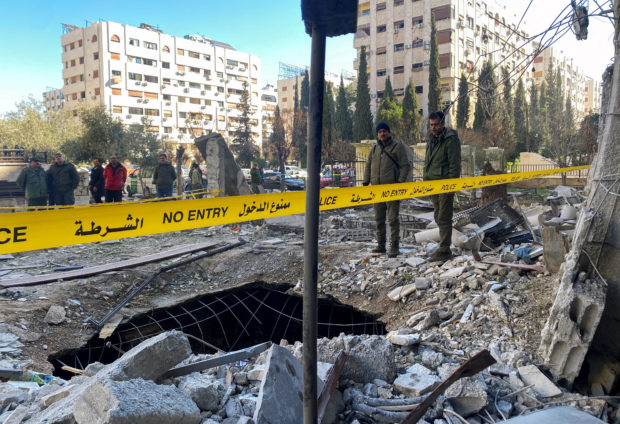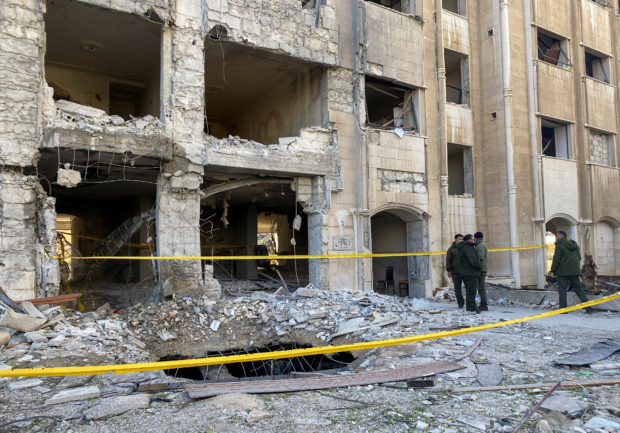Israeli missile strikes building in central Damascus, five dead

Police officers stand on the rubble of a damaged building at the site of a rocket attack, in central Damascus’ Kafr Sousa neighborhood, Syria, February 19, 2023. REUTERS/Firas Makdessi
AMMAN — An Israeli rocket strike early on Sunday hit a building in the central Damascus neighborhood of Kafr Sousa, near a heavily guarded security complex close to Iranian installations, killing five people, witnesses and officials said.
The strike, a rare one aimed at a residential area in the heart of the city, damaged several buildings in the densely populated district close to Omayyad square.
An Israeli military spokesperson declined to comment.
Citing a Syrian military source, state media said Israel had carried out air strikes targeting several areas in the capital shortly after midnight, causing five deaths and 15 injuries among civilians.
“It caused damage to several civilian homes and material damage to a number of neighbourhoods in Damascus and its vicinity,” the Syrian army said in a statement.
Article continues after this advertisementSyrian military sources not authorised to speak publicly said stray anti-aircraft rockets fired from the strategic Mount Qasioun to counter the Israeli attack hit several other locations, including the vicinity of the capital’s historic citadel.
Article continues after this advertisementIt was not immediately clear whether the strike that hit the basement of the building in Kafr Sousa was aimed at a specific individual.
Two western intelligence sources said the target was a logistics centre in the building run by Iran’s Islamic Revolutionary Guard Corps (IRGC).

Police officers stand near a damaged building at the site of a rocket attack, in central Damascus’ Kafr Sousa neighborhood, Syria, February 19, 2023. REUTERS/Firas Makdessi
Syria’s close allies, Russia and Iran, whose military support helped President Bashar al Assad turn the tide of the war in his favour, both said they strongly condemned the strikes, warning that they threatened regional stability.
Pro-Iran Hezbollah’s top commander Imad Moughniyeh was killed in 2008 in a bombing in Kafr Sousa, a heavily policed area where residents say several Iranian security agencies are located, including a major cultural centre.
Although officials rarely acknowledge responsibility for specific operations, Israel has been carrying out air strikes against suspected Iranian-sponsored weapons transfers and personnel deployments in next-door Syria for almost a decade.
Israel has also in recent months intensified strikes on Syrian airports and air bases to disrupt Iran’s increasing use of aerial supply lines to deliver arms to allies in Syria and Lebanon, including Lebanon’s Iran-backed Hezbollah.
The strikes are part of an escalation of what has been a low-intensity conflict whose goal was to slow down Iran’s growing entrenchment in Syria, Israeli military experts say.
Iran’s proxy militias, led by Hezbollah, now hold sway in vast areas in eastern, southern and northwestern Syria and in several suburbs around the capital.
Syrian President Bashar al-Assad’s government has never publicly acknowledged that Iranian forces operate on his behalf in Syria’s civil war, saying Tehran has only military advisers on the ground.